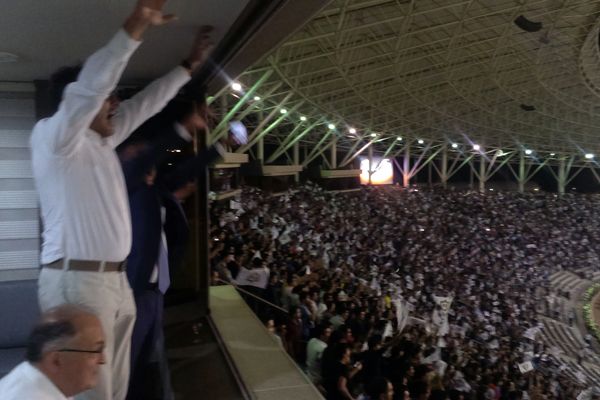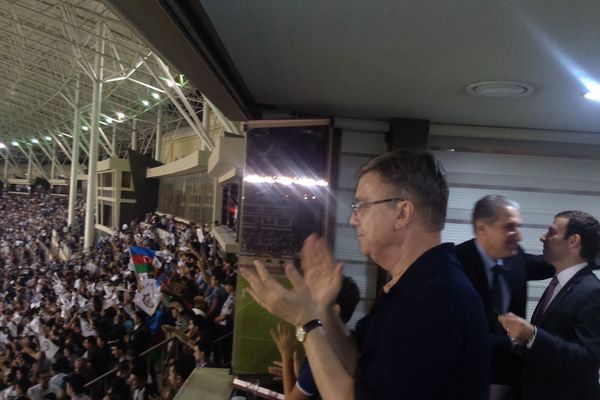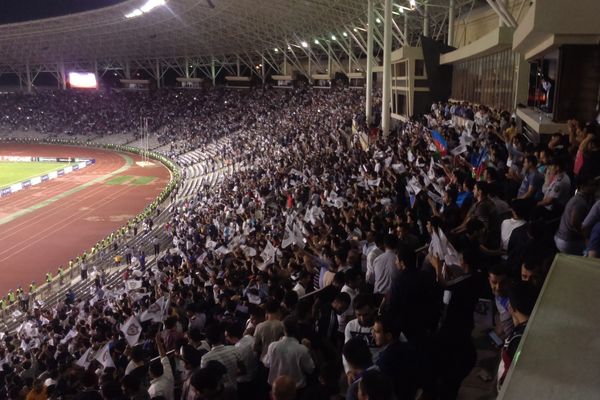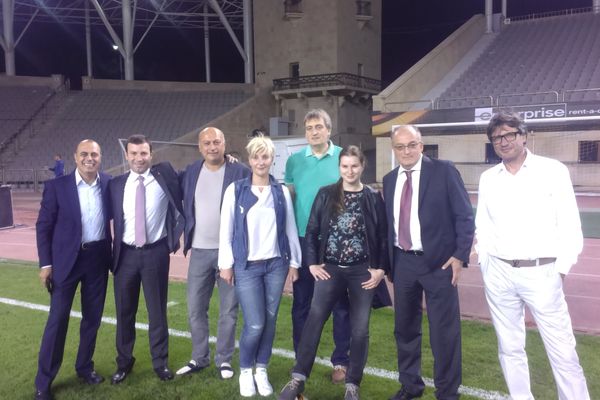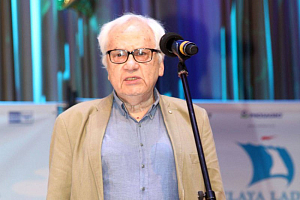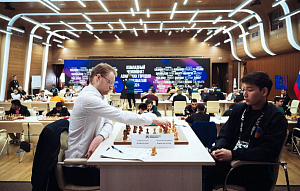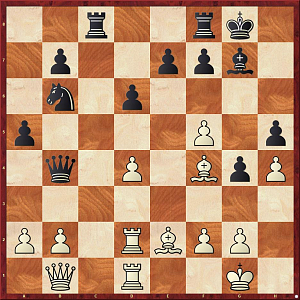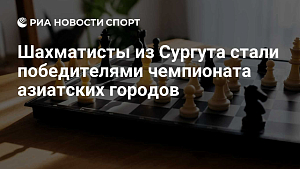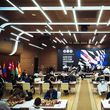3 October 2015
A Sacrifice, a Pin and a Golden Whistle
Game one of the World Cup final in the review of Vladimir Barsky.
My first day in Baku turned out to be very rich in events: I was straight out of the plane and into the tournament hall where the game Svidler-Karjakin was already in full swing, while in the evening I happily accepted the kind invitation of Mahir Mamedov to watch a football match Karabagh-Anderlecht. I managed to cast a brief glance at the full of greenery city only from a couple of windows (that of the car and that of my hotel room that offers a panoramic view), but the occasion to take a walk along the famous Primorsky Boulevard is undoubtedly still there waiting for me.
Following about an hour and a half of play, Peter Svidler carried out a central breakthrough 16.d4. There were fears that in the next 10 moves the opponents would sweep half the pieces off the board to shake hands and go home. It would have been hardly surprising as the final match is twice as long as the matches of all the preceding stages of the World Cup as it consists of as many as four classic games, while a brief reconnaissance in the first of them is only natural and understandable. One of the concerned spectators even asked as a joke whether the Russian participants could go to the length of arranging four "days off" in the classical games in order to seal the outcome of the struggle in the tiebreak. The irreplaceable online commentator in the Russian language grandmaster Sergey Shipov and the author of these lines objected that the times of Curacao were fortunately long since over and that similar secret deals between the compatriots should not be expected.
The concerns of our esteemed companion were finally dispelled by Peter Svidler, who was in no hurry of regaining the pawn, which would have resulted in the massive exchanges and a draw, but rather started to methodically "tie" the black pieces down along the white diagonals and the b-file. At that moment Sergey Karjakin also realized that he was not only quick in jumping at certain conclusions, but also played rather quickly in general as he devoted a lot of his time to the opening part of the game, whereas the move 20...Rb8 was granted with only about a minute of his attention. Meanwhile, it was this move that might have turned out to be a decisive mistake as in his advanced calculations Black failed to take a decent stock of the cunning 21.Rb1!
The game ended shortly after and the winner answered the questions posed by me and the correspondent of the Mayak radio station Elmira Mirzoeva.
“Peter, is it possible to say that your opponent simply collapsed today?”
“The fate of the game was sealed within a short interval when Sergey believed that the tactical operation, which I was undertaking in the center, was leading to a forced draw, whereas, frankly speaking, it was leading there not at all. In his advanced calculations he blundered (or, say, significantly underestimated) the move 21.Rb1, after which Black's position was already very unpleasant. In addition to that the whole nature of the struggle changed drastically... He was obviously not fond of his own position. He could have defended in a more stubborn manned, but committed another mistake, upon which Black's position crumbled down irreparably.
“Black was all right prior to that and I think that his position was objectively more fun to play than mine. It was just that it proved to be a very, very difficult type of play since both sides featured a huge amount of possibilities.”
“Has Sergey committed a blunder?”
“Well. It was not that he had some error in his evaluations or failed to grasp the essence of what was going on. He believed that he successfully calculated some forced lengthy variation, which turned out to be not that much forced.”
“Speaking about the match strategy…”
“Well, there is no such thing as a match strategy! This event is so lengthy that the basic task is to reach the chess table and try as much as possible to take control of what is going on over the board for, say, the entire duration of three or four hours. A psychological fatigue that builds up towards the end of the World Cup should in no case be underestimated! I say it as someone who has already seen it all in the past and during this year, too. You get so much tired... It is not so much in the way of physical tiredness, but rather you start feeling low on your batteries.”
“You mean a psychological fatigue?”
“Yes.”
“What would you do to get over it? Would you take a lot of walk in the fresh air? Are there any special techniques that you apply?”
“I try to come up with something in order to allow more fresh air. I would cope with varying success. Well, what should I do? I will definitely not start complaining about the fact that I have gone as far as the final of the World Cup!”
Svidler – Karjakin
1.Nf3 Nf6 2.g3 d5 3.Bg2 e6 4.0–0 Be7 5.d3 0–0 6.Nbd2 c5 7.e4 Nc6 8.Re1 b5 9.exd5
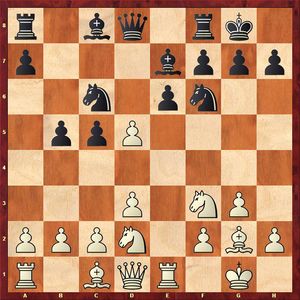
9…Nxd5 10.Ne4 Bb7 11.c3 a6 12.a4 b4 13.Bg5 f6 14.Bd2 e5 15.Rc1 Rf7 16.d4 bxc3 17.bxc3 cxd4 18.cxd4 Nxd4 19.Nxd4 exd4 20.Qb3 Rb8
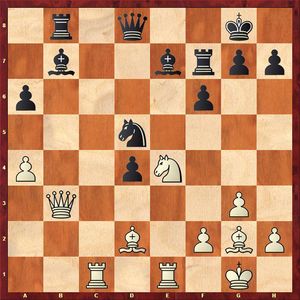
21.Rb1! Qd7 22.Rec1 Qe6 23.Nc5 Bxc5 24.Rxc5 Rd8 25.Ba5 Rd6 26.Qc4 Nc3 27.Rxb7 Qe1+ 28.Bf1 Ne2+ 29.Qxe2 Black resigns.
“Peter, does this game continue the dispute that started in Chita in the same line in your encounter against Igor Lysyj?”
“I have already played two similar games against Sergey. At the last year's Candidates tournament I lost one of the most complex and interesting games to him as White, and later on we drew at the Russian Club Championship. We also tried the Nf3, g3 line at the FIDE Grand Prix in Khanty-Mansiysk in May, but that game evolved towards a slightly different direction. That is, there is a long story behind our disputes. The game against Igor was played in between an infinite row of games played against Sergey! The game in Chita was the last in a chronological order, but it is Sergey who has remained my main "ideological" opponent in this line.
“Should I say that I have obtained a good position? No. However, the position that we ended up being in was of a rather complex nature.”
“Sergey opted for 9…Nxd5. Recapturing on d5 with a pawn is also a good option, isn’t’ it?”
“Yes. I do not believe that Black is up against any type of problems. However, Sergey correctly assumed (in my opinion) that since he had played 9...exd5 more than once already, I would then focus all my attention on this line. Meanwhile, after 9...Nxd5 I realized that somewhere after 10.a4 b4 11.Nc4 my book stops abruptly with the evaluation "White has a good reliable position." I did not understand if it was indeed reliable and good and where to go next, so I decided that it was essential that the picture be changed a little bit. And then, to put it crudely, be it what it may be!
“When playing 15...Rf7 Sergey was already anticipating the position resulting after 20.Qb3 as all of it was arising in a semi-forced manner. He thought that he would just go 20... Rb8 and be all right, when in fact after 21.Rb1 he was not. However, if he had played 22... h6 instead of 22... Qe6 I fail to see how White was going to reach a winning position after all; maybe there is no win at all.”
“Well, the computer’s evaluation at that moment was already very unsatisfactory for Black...”
“I am aware of that. At least during the game I failed to discover any winning advantage for White.”
“According to the engine, White features quite an apparent advantage after 20.Qb3 already.”
“Well, it all boils down to the fact that you need to come up with 21.Rb1 in response to 20…Rb8. Any other move allows Black to untangle, whereas after 21.Rb1 it suddenly becomes clear that all Black's pieces were tied down to some sort of defensive duties and that it was already up to me to chose between more than one way to win material.”
“In response to 21.Rb1 the iron mind considers 21... Qf8 to be the most stubborn response. However, such a move would probably never cross a human player’s mind, would it?”
“I think this move came into my view, although it seemed to me that it was not going to help much. Once I reach my hotel room I am going to see how I was winning after 22.Rec1 h6; I have a strong feeling that my position is very good, but I still fail to see how exactly I am supposed to go about winning in that line. Meanwhile, after 22...Qe6 all I needed was to count one continuation only and, thanks God, I managed to raise up to the occasion.”
“Have you managed to have a good rest during two days off in between the semifinal and the final?”
“Well, how to put it better? In a certain sense, at the present moment for me the game in the final starts as though from the very beginning; it went a little tight for me today in terms of tuning into the play. But, in general, having already as many as six rounds of this event behind you the more rest you manage to get the better! Complaining that one needs to tune into the play once again after that would be a stupid complaint because the opposite would have been much worse!”
…And late in the evening "Karabagh" generated a main sensation of the Europa League by defeating the Belgian "Anderlecht" with a 1-0 score. I visited a football game for the first time in my life and got such a huge positive emotional charge! On top of all that, when the game was over, I was into luck to join the inner sanctum by stepping out on the green lawn and hitting the ball which proved to be so blessed for the Azerbaijani team.
The stadium in the center of Baku is named after the football referee Tofiq Bahramov and he is the world's only referee who has been granted with such an honor. Here's what Wikipedia reads: "Bahramov was a linesmen in the final match of the 1966 World Cup between England and Germany. The regulation time ended in a 2 -2 draw. In the extra time after one of the shots by Hurst the ball bounced off the crossbar sharply downwards, hit the ground and then span backwards away from the goal line and into the field. The debates around the ball having or not crossed the goal line have not ceased until this very day. The moment when the ball bounced off the crossbar, the English football players threw up their hands in a burst of happiness. Referee Dienst suspended the game and, breaking through the wall of German players, rushed towards Bahramov. The latter nodded his head to confirm that it was a goal. He was surrounded by the Germans who were passionately protesting against this decision, but Bahramov remained adamant...
There is still one interesting detail to add here: in all previous finals prior to that memorable match a symbolic golden whistle had been awarded only to the chief referees, whereas in 1966, all the referees of the final match (linesmen included) were awarded with gold whistles as well. On top of that Tofiq Bahramov was granted with a duplicate of the "golden goddess" from the hands of the Queen of Great Britain."
And what about the current location of the golden whistle of Tofiq Bahramov, which was so much hunted after by the collectors from all over the world, and by the British ones above all? Oh, this is yet another beautiful story, which we are definitely going to come back to next time around!
Pictures by Eteri Kublashvili and Vladimir Barsky












